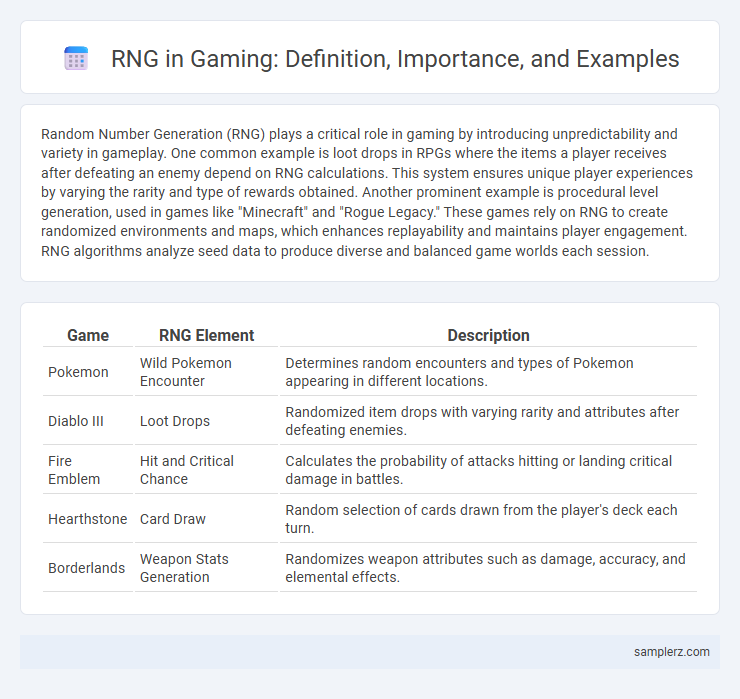Random Number Generation (RNG) plays a critical role in gaming by introducing unpredictability and variety in gameplay. One common example is loot drops in RPGs where the items a player receives after defeating an enemy depend on RNG calculations. This system ensures unique player experiences by varying the rarity and type of rewards obtained. Another prominent example is procedural level generation, used in games like "Minecraft" and "Rogue Legacy." These games rely on RNG to create randomized environments and maps, which enhances replayability and maintains player engagement. RNG algorithms analyze seed data to produce diverse and balanced game worlds each session.
Table of Comparison
| Game | RNG Element | Description |
|---|---|---|
| Pokemon | Wild Pokemon Encounter | Determines random encounters and types of Pokemon appearing in different locations. |
| Diablo III | Loot Drops | Randomized item drops with varying rarity and attributes after defeating enemies. |
| Fire Emblem | Hit and Critical Chance | Calculates the probability of attacks hitting or landing critical damage in battles. |
| Hearthstone | Card Draw | Random selection of cards drawn from the player's deck each turn. |
| Borderlands | Weapon Stats Generation | Randomizes weapon attributes such as damage, accuracy, and elemental effects. |
Understanding RNG: The Backbone of Gaming Randomness
Random Number Generation (RNG) in gaming determines unpredictable outcomes such as loot drops, critical hits, and procedural level generation, creating dynamic player experiences. Popular games like "Minecraft" use RNG for world generation, while titles like "Diablo" rely on RNG for randomized loot and enemy encounters. Mastery of RNG mechanics is crucial for strategizing and optimizing gameplay performance.
Classic Card Games: RNG in Digital Poker and Blackjack
Random Number Generators (RNG) in digital poker and blackjack ensure fairness by simulating the unpredictability of card shuffling and dealing. These algorithms produce cryptographically secure sequences that replicate the randomness of classic card games, preventing patterns and biases. By maintaining true randomness, RNG enhances the integrity and trustworthiness of online poker and blackjack platforms.
Procedurally Generated Worlds: RNG in Roguelikes
Procedurally generated worlds in roguelike games use RNG (random number generation) to create unique maps, enemy placements, and item drops every playthrough. This randomness ensures high replayability by offering unpredictable challenges and environments in titles such as "The Binding of Isaac" and "Spelunky." RNG-driven procedural generation balances difficulty and content variety, making each gaming session novel and engaging for players.
Loot Drops and Rare Items: RNG in RPGs and MMOs
RNG in RPGs and MMOs governs loot drops, determining the rarity and type of items players receive from defeated enemies or chests. This randomized system creates excitement and replayability by offering a chance to obtain rare weapons, armor, or cosmetic items that significantly enhance gameplay. The unpredictability of RNG-driven loot encourages exploration and continuous engagement, driving both player progression and in-game economies.
Gacha Systems: RNG in Mobile and Free-to-Play Games
Gacha systems in mobile and free-to-play games rely heavily on RNG to determine the rarity and type of in-game items or characters players receive. These systems simulate lottery mechanics, where each pull has a predefined probability distribution for common, rare, or ultra-rare rewards, influencing player engagement and monetization. RNG algorithms ensure unpredictability while allowing developers to control drop rates, balancing player satisfaction and game economy.
Enemy Encounters: RPGs and Random Battles
Enemy encounters in RPGs often rely on RNG to determine the frequency and type of random battles, creating unpredictable combat scenarios that enhance replayability. This system uses algorithms to generate diverse enemy group compositions, challenging players with varied difficulty levels and strategic demands. Random battles driven by RNG promote dynamic gameplay by preventing repetitive patterns and encouraging adaptable tactics.
Critical Hits and Misses: RNG in Combat Mechanics
Critical hits and misses in gaming rely heavily on RNG to determine the outcome of attacks, adding unpredictability and excitement to combat mechanics. In titles like Dark Souls or Pokemon, RNG calculates chances for critical damage or failure based on player stats and random number generation. This randomness ensures varied gameplay experiences, influencing strategy and player decision-making in battles.
Map Generation: RNG in Battle Royale and Strategy Games
Random Number Generation (RNG) plays a crucial role in map generation for Battle Royale and strategy games by creating unpredictable and diverse environments that enhance replayability. In games like Fortnite and PUBG, RNG determines the placement of loot, terrain features, and safe zones, ensuring each match offers a unique tactical experience. Strategy games such as Civilization utilize RNG to generate varied map layouts, resource distributions, and AI behaviors, fostering dynamic gameplay and strategic decision-making.
Random Events: RNG in Simulation and Sandbox Games
Random Number Generation (RNG) in simulation and sandbox games influences unpredictable events such as weather changes, resource spawning, and NPC behavior. Titles like The Sims utilize RNG to determine characters' daily moods and interactions, creating dynamic gameplay experiences. Minecraft employs RNG to randomly generate world structures and resource distribution, ensuring unique playthroughs for each player.
RNG in Esports: Balancing Skill and Chance
Random Number Generation (RNG) in esports creates unpredictable elements like loot drops, critical hits, and map spawns, which balance skill and chance during competitive play. Titles such as Fortnite and Hearthstone utilize RNG to introduce variability, challenging players to adapt strategies beyond pure mechanical skill. This fusion of randomness and player decision-making ensures dynamic gameplay, maintaining audience engagement and competitive fairness.

example of RNG in gaming Infographic
 samplerz.com
samplerz.com